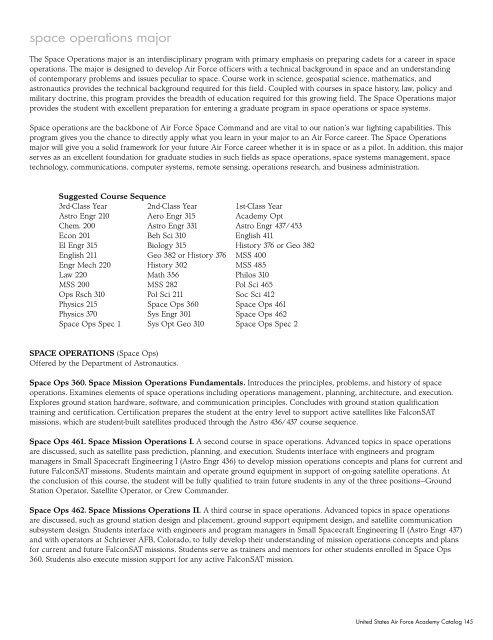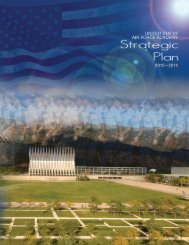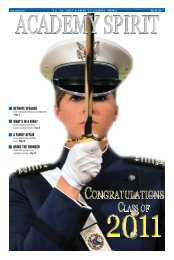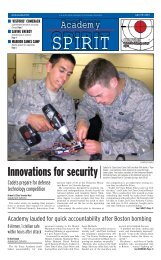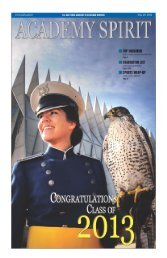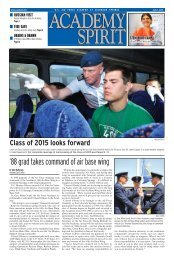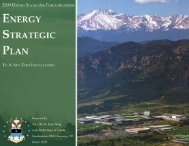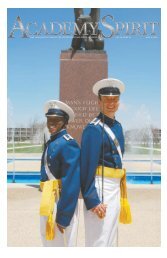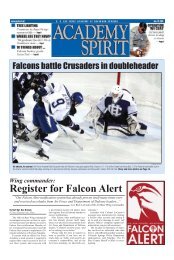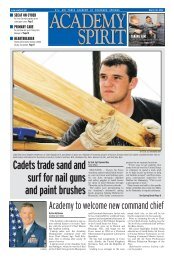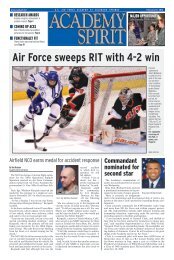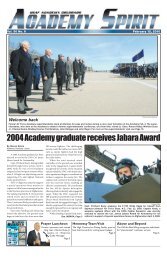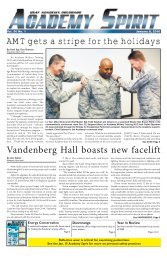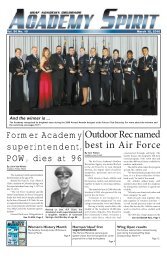2008-2009 Catalog - United States Air Force Academy
2008-2009 Catalog - United States Air Force Academy
2008-2009 Catalog - United States Air Force Academy
Create successful ePaper yourself
Turn your PDF publications into a flip-book with our unique Google optimized e-Paper software.
space operations major<br />
The Space Operations major is an interdisciplinary program with primary emphasis on preparing cadets for a career in space<br />
operations. The major is designed to develop <strong>Air</strong> <strong>Force</strong> officers with a technical background in space and an understanding<br />
of contemporary problems and issues peculiar to space. Course work in science, geospatial science, mathematics, and<br />
astronautics provides the technical background required for this field. Coupled with courses in space history, law, policy and<br />
military doctrine, this program provides the breadth of education required for this growing field. The Space Operations major<br />
provides the student with excellent preparation for entering a graduate program in space operations or space systems.<br />
Space operations are the backbone of <strong>Air</strong> <strong>Force</strong> Space Command and are vital to our nation’s war fighting capabilities. This<br />
program gives you the chance to directly apply what you learn in your major to an <strong>Air</strong> <strong>Force</strong> career. The Space Operations<br />
major will give you a solid framework for your future <strong>Air</strong> <strong>Force</strong> career whether it is in space or as a pilot. In addition, this major<br />
serves as an excellent foundation for graduate studies in such fields as space operations, space systems management, space<br />
technology, communications, computer systems, remote sensing, operations research, and business administration.<br />
Suggested Course Sequence<br />
3rd-Class Year 2nd-Class Year 1st-Class Year<br />
Astro Engr 210 Aero Engr 315 <strong>Academy</strong> Opt<br />
Chem. 200 Astro Engr 331 Astro Engr 437/453<br />
Econ 201 Beh Sci 310 English 411<br />
El Engr 315 Biology 315 History 376 or Geo 382<br />
English 211 Geo 382 or History 376 MSS 400<br />
Engr Mech 220 History 302 MSS 485<br />
Law 220 Math 356 Philos 310<br />
MSS 200 MSS 282 Pol Sci 465<br />
Ops Rsch 310 Pol Sci 211 Soc Sci 412<br />
Physics 215 Space Ops 360 Space Ops 461<br />
Physics 370 Sys Engr 301 Space Ops 462<br />
Space Ops Spec 1 Sys Opt Geo 310 Space Ops Spec 2<br />
SPACE OPERATIONS (Space Ops)<br />
Offered by the Department of Astronautics.<br />
Space Ops 360. Space Mission Operations Fundamentals. Introduces the principles, problems, and history of space<br />
operations. Examines elements of space operations including operations management, planning, architecture, and execution.<br />
Explores ground station hardware, software, and communication principles. Concludes with ground station qualification<br />
training and certification. Certification prepares the student at the entry level to support active satellites like FalconSAT<br />
missions, which are student-built satellites produced through the Astro 436/437 course sequence.<br />
Space Ops 461. Space Mission Operations I. A second course in space operations. Advanced topics in space operations<br />
are discussed, such as satellite pass prediction, planning, and execution. Students interface with engineers and program<br />
managers in Small Spacecraft Engineering I (Astro Engr 436) to develop mission operations concepts and plans for current and<br />
future FalconSAT missions. Students maintain and operate ground equipment in support of on-going satellite operations. At<br />
the conclusion of this course, the student will be fully qualified to train future students in any of the three positions—Ground<br />
Station Operator, Satellite Operator, or Crew Commander.<br />
Space Ops 462. Space Missions Operations II. A third course in space operations. Advanced topics in space operations<br />
are discussed, such as ground station design and placement, ground support equipment design, and satellite communication<br />
subsystem design. Students interface with engineers and program managers in Small Spacecraft Engineering II (Astro Engr 437)<br />
and with operators at Schriever AFB, Colorado, to fully develop their understanding of mission operations concepts and plans<br />
for current and future FalconSAT missions. Students serve as trainers and mentors for other students enrolled in Space Ops<br />
360. Students also execute mission support for any active FalconSAT mission.<br />
<strong>United</strong> <strong>States</strong> <strong>Air</strong> <strong>Force</strong> <strong>Academy</strong> <strong>Catalog</strong> 145


